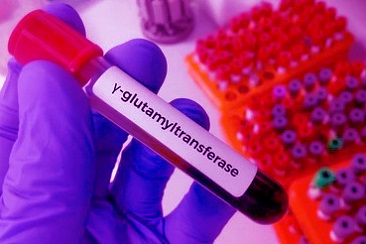Japanese doctors find that Gamma-Glutamyltransferase levels can be used as biomarkers for colorectal cancer risk
Nikhil Prasad Fact checked by:Thailand Medical News Team Nov 01, 2024 1 year, 2 months, 3 weeks, 2 days, 4 hours, 47 minutes ago
Medical News: Colorectal cancer ranks among the most prevalent cancers worldwide, and a recent study by researchers from Saitama Medical University in Japan has shed light on a new factor that could help in early identification of high-risk individuals: Gamma-Glutamyltransferase (GGT) levels. GGT, an enzyme linked to liver function, has been found to have a significant relationship with colorectal adenomas and cancer. This
Medical News report explores the study’s methods, results, and the implications of GGT as a potential risk indicator for colorectal health, particularly for patients undergoing routine health checkups.
 Japanese doctors find that Gamma-Glutamyltransferase levels can be used as biomarkers for colorectal cancer risk
Understanding GGT: Beyond Liver Function
Japanese doctors find that Gamma-Glutamyltransferase levels can be used as biomarkers for colorectal cancer risk
Understanding GGT: Beyond Liver Function
GGT is widely known as a marker of liver health, as it’s commonly elevated in cases of liver damage or excessive alcohol consumption. However, its role appears to extend beyond liver function, with links to metabolic disorders, oxidative stress, and even the onset of certain cancers. The Saitama Medical University researchers sought to understand whether elevated GGT levels could be used as an indicator to identify patients at risk for colorectal adenomas - growths that can develop into cancer if left untreated.
Study Design and Participant Selection
The study included a total of 529 Japanese adults referred for colonoscopy due to a positive fecal occult blood test, an early screening tool for colorectal diseases. Among these, 417 patients qualified for the study after certain exclusion criteria were applied. The subjects were divided into groups based on their colonoscopy findings: those with colorectal adenomas or cancer (case group) and those without any abnormal findings (control group).
The researchers collected demographic and clinical data, including age, body measurements, and health habits, and then analyzed the differences between those with and without colorectal abnormalities. Laboratory tests, such as fasting plasma glucose and liver enzymes, were conducted, with a particular focus on GGT levels.
Key Findings on GGT and Colorectal Cancer Risk
The study found that higher GGT levels were a significant risk factor for both colorectal adenomas and cancer, even after accounting for traditional risk factors such as age, sex, and body mass index (BMI). In addition to these known risk factors, GGT emerged as a new indicator to consider for colorectal health assessment.
Interestingly, among patients with elevated GGT levels, the likelihood of colorectal abnormalities was significantly higher compared to those with normal levels. The research also highlighted that patients with fatty liver - often associated with high GGT levels - tended to be at higher risk for adenomas and cancer, though fatty liver alone was not identified as an independent risk factor when considered alongside other variables.
Other Contributing Risk Factors
r />
The study confirmed several well-known risk factors for colorectal cancer, such as male sex, older age, higher BMI, and alcohol consumption. However, the data suggest that the combination of elevated GGT levels with these traditional risk factors could enhance the accuracy of colorectal cancer risk predictions. This finding is particularly relevant for health systems in Japan and other regions where comprehensive health checkups, including GGT measurement, are routine.
Implications for Screening and Prevention
With GGT levels showing a meaningful correlation with colorectal cancer risk, the study’s findings could lead to changes in colorectal cancer screening protocols. For patients with elevated GGT levels, especially those with other risk factors, early colonoscopy could be a proactive step to detect adenomas before they progress to cancer. This approach could potentially reduce colorectal cancer incidence, as early detection and removal of adenomas effectively prevent cancer development.
Conclusions: A New Avenue in Colorectal Cancer Screening
The study from Saitama Medical University offers valuable insights into colorectal cancer prevention, suggesting that GGT measurement could play a crucial role in identifying individuals at higher risk. This could be particularly beneficial in screening protocols for populations that already undergo routine GGT testing as part of health checkups. Early intervention for those with elevated GGT levels may enhance colorectal cancer prevention efforts, helping reduce both cancer incidence and related mortality.
The study findings were published in the peer-reviewed Journal of Personalized Medicine.
https://www.mdpi.com/2075-4426/14/11/1082
For the latest on Colorectal Cancer, keep on logging to Thailand Medical News.
Read Also:
https://www.thailandmedical.news/news/microplastics-linked-to-colorectal-cancer-and-inflammatory-bowel-disease
https://www.thailandmedical.news/news/how-a-tiny-molecule-could-change-outcomes-in-colorectal-cancer
https://www.thailandmedical.news/news/non-invasive-home-based-screening-reduces-risk-of-colorectal-cancer-death-by-33-percent
